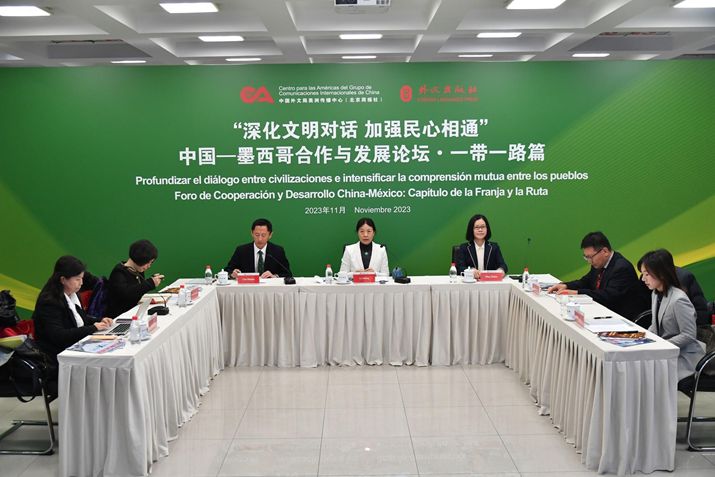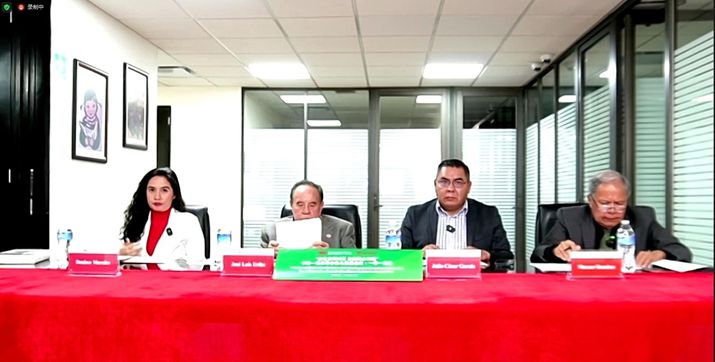China and Mexico set to expand depth and breadth of multifaceted exchanges

The friendship between China and Mexico has grown stronger over time. Last year the two countries celebrated the 50th anniversary of diplomatic ties and this year marks the 10th anniversary of the establishment of the China-Mexico comprehensive strategic partnership, a partnership that shares benefits, risks, control and contributions in strategic areas such as trade.
This year also marks the 10th anniversary of the launch of the Belt and Road Initiative (BRI), a China-proposed strategy to boost global connectivity along and beyond the ancient Silk Road routes.
Centering on deepening dialogue and mutual understanding among civilizations, the China-Mexico Cooperation and Development Forum: Belt and Road Chapter, co-hosted by the China International Communications Group (CICG) Center for the Americas and the Foreign Languages Press, took place online and in person in both Beijing and Mexico City on November 28. Participants from China and Mexico shared their thoughts on cultural and people-to-people exchanges.
“The bond between the two peoples is getting stronger,” Chinese Ambassador to Mexico Zhang Run told the forum discussing the countries’ cooperation and development opportunities.
“Throughout my tenure as China’s ambassador to Mexico over the past 10 months, I have visited 10-plus Mexican states and cities. What I’ve heard the most is a strong desire for Mexico to seize the opportunities arising from Chinese modernization and the BRI. There is a consensus to collaborate with China instead of pursuing decoupling,” Zhang told the forum, adding both nations must draw insights from each other’s rich civilizations and developmental experiences. In doing so, they can unlock greater potential for cooperation to advance bilateral relations.
Over the past decade, China and Mexico have understood and supported each other’s core interests and major concerns. According to the Chinese Customs, bilateral trade had approached $100 billion as of late 2022, with cooperation highlights in infrastructure, automobiles and renewable energy.
Li Yafang, President of the CICG Center for Americas, noted that the collaborative success of China and Latin America and the Caribbean (LAC) countries in pursuing the BRI holds valuable lessons for the continued development of China-Mexico relations.
At present, China is actively pursuing modernization with its own characteristics as part of its national rejuvenation. China’s goal is not self-centered modernization, but rather the pursuit of modernization together with other countries, especially those in the developing world. Mexico is charting its own course of modernization as its people strive for a better life.
“In this quest, China and Mexico share a common dream,” Li concluded.
According to Ding Zhitao, Deputy Editor-in-Chief of the Foreign Languages Press, in the process of jointly building the Belt and Road, different forms of people-to-people exchanges between countries and regions continue to deepen and present a colorful vision.
She believed that book translation and publication, as an important carrier and manifestation of cultural exchange, plays an irreplaceable and fundamental role and has a lasting impact on promoting cultural interaction, mutual understanding and people-to-people connectivity among countries involved in the BRI.
Chen Yuanting, Secretary-General of the Mexico Research Center at the Latin America Research Institute under the Chinese Academy of Social Sciences, emphasized the pioneering role think tanks play in boosting dialogue and cultural exchange between the two countries.
“In the future, think tank exchanges and China-Mexican cooperation should become a new growth point in the comprehensive strategic partnership between the two countries, and establish a favorable interactive pattern between think tanks, governments, media and enterprises of the two countries,” she said.
Over the past decade, telling the stories of the BRI and promoting common development and prosperity have become a shared responsibility among the media of the participating countries, CGTN Spanish anchor Deng Ying told the forum. “Media exchanges and cooperation have also enhanced mutual understanding among nations and deepened friendship and trust.”

José Luis Uribe, President of Club Primera Plana, Mexico’s oldest media organization, echoed Deng’s sentiments, further noting that the BRI Journalists Cooperation Platform, undoubtedly the largest international organization of communicators, has been nurturing collaboration since its establishment in 2018. The platform aims to lift mutual understanding and friendship among journalists from more than 100 countries.
Both Ehécatl Lázaro Méndez, a researcher with the Mexican Center for Economic and Social Studies, and Julio César García, Director of Channel 6 TV (Mexico), believed Mexico’s inclusion in the BRI is a pending step. They urged the Global South, including Mexico, to recognize the significance of this historical moment and search its own path toward modernization.
“Multilateralism is a fundamental element in the initiatives China has put forward on the international stage. The BRI was the first of these (initiatives),” Denisse Morales, President of Global Diplomacy Leadership Actions for Empowerment, said at the forum.
“The BRI has established global connections through infrastructure and trade, reshaping the dynamics between developing countries and the international cooperation system. It has brought about transformative changes for both China and the world,” Morales pointed out.
“When I was still teaching at a public institution of higher learning, I exchanged ideas with my students and explained to them the position and importance of China in the contemporary world. Now, in my retirement, I persist in spreading and defending the idea that the world is progressing and the future is bright,” Nicanor Ramirez, a Mexican reader of China Hoy magazine, the Spanish-language monthly of CICG Center for Americas, for 50-plus years, told the forum.
Through the China-Mexico Cooperation and Development Forum, we aspire to continually expand the depth and breadth of multifaceted exchanges between the media and think tanks of both nations. By fully tapping into the potential for collaboration, we aim to contribute to strengthening bilateral cooperation, facilitate the exchange of governance experiences, foster mutual learning in cultural exchange, and advance the enduring stability and development of China-Mexico relations, Gao Dingbo, Associate President of the CICG Center for Americas, said.
“Even with a temperature difference of 10+ degrees Celsius between Beijing and Mexico City, the exchange of perspectives carries a shared warmth, embodies a common vision,” he concluded.